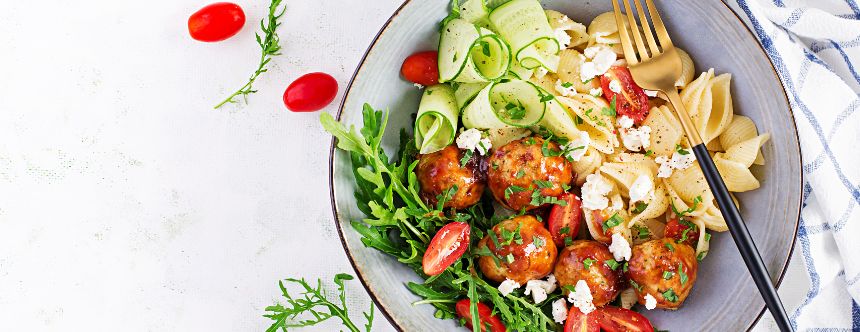Getting to grips with your nutrition can be daunting. Straight away you’re bombarded with terms like macro-nutrients, meal timing, calories and you’d rather remain oblivious and turn to the current health fad that seems to suit you best.
At Dukes, we’ll cut straight through all the info that is unnecessary and just confusing, to give you all the clarity you need.
For a summarised quick guide to macronutrients, we’ll provide you with a summary in this first paragraph. But to gain a complete and comprehensive understanding, read on using the heading tags for any further questions that will pop into your mind.
The calories we consume in food are made up of three key macronutrients:
As the name MACROnutrients suggests, these are the nutrients our bodies use in BIG amounts to function properly. You’ll want to have an adequate amount of each of these to maintain your bodily functions. Each Macronutrient is responsible for different functions and biological processes, but as long as you’re eating a balanced, whole foods diet, you don’t really need to worry too much about what your exact ratio is, as long as you feel fit and healthy. If you’re experiencing a lack in energy or similar, you’ll want to keep reading to gain an exact understanding of these and figure out what your diet might be lacking. Head to the above numbered headings for the macronutrient you’d like to learn more about.
Protein
Proteins play a huge role in recovery as well as energy production. Our bodies need protein from the foods we eat to build and maintain bones, muscles and skin. They are also the most satiating of all the macronutrients, meaning you will feel fuller for a given number of calories consumed. This essentially makes it the most important for both muscle gain and fat loss and hence, it is often the most talked about when it comes to a healthy well balanced diet. 1 gram of protein contains 4 calories.
The process of repairing and building muscle sees protein as the most essential macronutrient. Protein is also the most thermogenic of all the macronutrients, meaning that it’s processing and digestion in the body leads to more caloric expenditure in and of itself as opposed to carbs or fats.
The amount of protein you need to optimize your recovery in the weight room and maintain or improve your body composition is a controversial topic and is constantly and continuously being researched and updated by scientists.
The most thrown around guideline in the fitness industry and ‘golden rule for optimal protein intake’ is 1 gram per pound of body weight. At Dukes, we believe that this guideline will be a good starting point for most individuals.
It is not too much protein to cause any problems in the gut, as protein is quite a hard macronutrient for the body to digest. It’s also not too little for you to run into any recovery issues.
If you feel the need to add more protein to your diet, you’re not finding any digestion problems such as bloating or gassiness, and your energy levels and progress in the gym aren’t impaired then go for it.
Likewise, if you are overweight and have entered a caloric deficit with limited calories, we suggest going by an estimated lean body mass weight and using 1 g per pound of lean body mass.
This will allow for more overall carbohydrate and fat intake, ensuring your energy levels throughout the diet don’t plummet.
Fats
Fats are essential for hormone production and to support cell growth. They also help protect your organs and help keep your body warm. Fats help your body absorb some nutrients and produce important hormones. 1 gram of fat contains 9 calories.
Your body definitely needs fats and once again, it is important to find out how you respond to them. Most people fare better, keeping their fats on the lower side and in turn upping their carbohydrate intake, as this will leave them feeling more energized and less lethargic.
Generally speaking, most individuals feel the best and meet their essential fat intake by aiming for 0.5g per kg of bodyweight. Again, use this as a baseline and adjust from there based on your body’s biofeedback in terms of energy levels and recovery.
Your total daily fat intake will add up quickly as there are lots of “trace fats” contained in most foods.
Carbohydrates
Carbohydrates are your body’s preferred source of energy. Your stomach enzymes break down carbohydrates into glucose (or blood sugar). Glucose is then used as the main source of energy for your cells, tissues, and organs. It is important you find out how your body responds to carbohydrates. Some individuals can eat large amounts in a single sitting and be rewarded with a long burst of energy, while others are better off spreading their carbohydrates over their daily meals, as large amounts leave them feeling lethargic and tired. 1 gram of carbohydrate contains 4 calories.
Many myths surround carbohydrates and weight loss, such as the fabled no carbs after 6pm, sugar makes you fat, or you should only eat low glycemic index (GI) carbs. Most, if not all of these myths have been debunked in recent research and literature.
As already stated, they are your body’s preferred source of energy. Hence cutting them out completely or limiting their intake will likely leave you lacking in:
- Energy – both mental and physical
- Performance in the weight room
- Recovery
- Mood may be impaired
Generally speaking, you should aim to keep your carbohydrate intake as high as possible while meeting the essential intake requirements for fats and protein as outlined above.
This will ensure maximum performance levels and recovery, ultimately fast tracking your progress.



